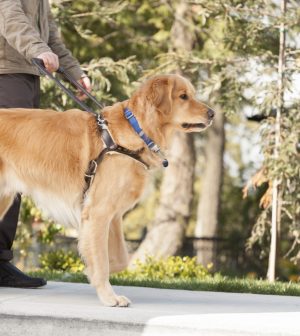- Do you subscribe to Dharma Dog Training’s Newsletter? You should.
- A Unique Campaign from The Humane Society of the United States
- Rabid bats in Omaha- Stay safe, prepared with these tips
- Springtime Activities in Omaha
- Mill Dog Monthly from Bailing Out Benji
- World Spay Day, Legislative Alert in Nebraska
- Attend the Nebraska Rescue Council’s monthly meeting this Saturday
- Five Hard-to-Ignore Reasons to Adopt!
- Paws in Pink to Benefit Breast Cancer Foundation
- VCA, Inc. Acquires MidWest Vet Specialists from Kansas State University
The Value and Importance of Service Dogs in Our Society

Are you or someone you love thinking about utilizing the assistance of a service dog and want to know more about them? You may not know this, but you can even train your dog to be a service dog.
Service dogs provide invaluable support for people with physical or mental disabilities. These faithful companions help people become more independent and improve their quality of life. They are trained to complete specific tasks, such as guiding the blind or reminding someone to take their medicine.
Service dogs keep people safe and out of danger as they respond appropriately to various situations. In this article, you will learn the value and importance of service dogs in our society and how having one can change your life.
What Are the Types of Service Dogs?
There are different types of service dogs for every disability. Each task a service dog performs directly correlates with the person’s disability or condition:
Guide Dogs
Guide dogs know how to direct the visually impaired toward their destination, and they wear special harnesses to navigate obstacles and help people who are blind get around safely. The dog’s job is to determine the optimum path to prevent danger. Breeds that make the best guide dogs:
- Standard Poodles
- Golden Retrievers
- Labrador Retrievers
- German Shepherds
According to the American Kennel Club, the handler commands the dog to cross the street when it is safe. “This is where the decision-making ability of the dog factors in.” The canine determines when to cross. Trust is imperative when it comes to the handler/guide dog relationship.
Hearing Dogs
Hearing dogs alert their owner to any sounds that they cannot hear:
- Doorbells
- Telephones
- Alarm clocks
- Smoke alarms
The American Kennel Club states, “Hearing dogs make physical contact with their owners, nudging or pawing them to get their attention.” They generally coerce their owner to follow the sound.
Psychiatric Support Dogs
Psychiatric support dogs help their owners who have mental disabilities like post-traumatic stress disorder. The dog may calm their owner or help ease emotional distress in these cases.
They help those with PTSD with their daily routine, as psychiatric support dogs encourage those who have trouble getting out of bed to exercise or socialize with others. Psychiatric support dogs also remind their owners to take their prescribed medicine.
Autism Support Dogs
Autism support dogs work with those who have special needs. Children who have autism often benefit from having their support dog come with them to school or their appointments. The dog may also decrease anxiety and social isolation. Support dogs can stop self-harming behaviors before they escalate. They can also lead kids who are having difficulties, like panic or anxiety, to a safe space.
Diabetic Alert Dogs
Diabetic alert dogs can be lifesavers when the person has an abnormal shift in their blood sugar. They are trained to sniff out dangerous changes in blood sugar, such as chemical changes in the breath they can smell. These miraculous pups will bring the person their insulin, wake the owner if needed, or get help when necessary.
Seizure Alert Dogs
Seizure alert dogs can recognize an oncoming seizure. It is thought that before having a seizure, a person may give off a particular scent, and the dog will alert their owner or bark for help. The time frame for a dog to be able to detect a seizure is up to one hour.
Dogs for Mobility Assistance
Mobility Assistance Dogs help people with limited mobility or may be in a wheelchair. These caring canine heroes will open doors, retrieve objects, or turn the lights on or off. Individuals with spinal cord injuries, cerebral palsy, or arthritis can benefit from a mobility assistance dog.
Service Dog Training and Certification
Service dogs do not need to be professionally trained. You can train your dog to be a service dog if you want. However, people with disabilities are often encouraged to work with a professional service dog organization or trainer. It is not legally required that the dog has certification. A service dog should:
- Be vigilant but not hyper
- Consistently perform repetitive tasks
- Remain calm, even in unfamiliar surroundings
- Have the ability to learn and retain information
Certification may not be required, but those with a service dog should be prepared to answer questions, like whether the service dog is with you due to a disability and your dog’s work.
It is not necessary to explain the disability or go into detail. The dog does not need to “prove” it is a service dog by performing its work. If you have a qualifying disability, your service dog can go wherever you go, even on an airplane.
Conclusion
Service dogs are extremely intelligent and amazing canine companions who will protect people with physical disabilities or who may experience some mental health issues. These pups are specially trained to perform complicated tasks that the person may not be able to perform themselves.
Service dogs can be wonderful furry friends for those with a qualifying disability. They can assure you in your time of need or comfort and a paw to hold.
Latest News
-
Join Us at Pick A Pooch 2025: A Fun-Filled Weekend for the Whole Family
A Fun-Filled Weekend for Pet Lovers and Families Alike Mark...
- Posted 1 year ago
- 0
-
Beardmore Presenting Sponsor At This Years Pick-A-Pooch event
🐾 We are thrilled to announce that Beardmore Subaru is...
- Posted 1 month ago
- 0
-
How Having A Pet Can Change Your Life
Having a pet can open your heart in ways that...
- Posted 3 months ago
- 0
-
How To Improve The Life Of Your Senior Pet
Do you have an elderly fur baby and want to...
- Posted 3 months ago
- 0
-
Springtime Activities To Enjoy With Your Furry Friends
Are you preparing for warmer weather and want some ideas...
- Posted 4 months ago
- 0
-
Pros And Cons Of Microchipping Your Pets
Have you considered whether your pets should be microchipped and...
- Posted 5 months ago
- 0
-
The Best New Fun Toys For Dogs And Cats
The Best New Fun Toys For Dogs And Cats Did...
- Posted 5 months ago
- 0
-
Heartfelt Ways To Show Your Pet You Love Them
Did you know there are more ways to show your...
- Posted 6 months ago
- 0


















You must be logged in to post a comment Login